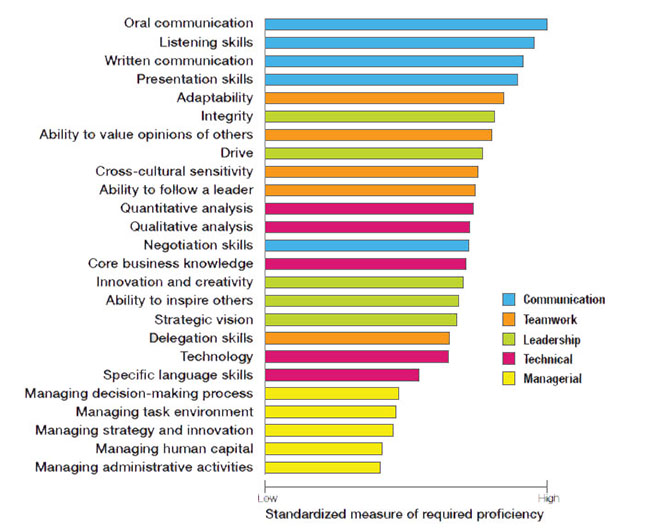Detailed Guide for Overcoming your Fear of Public Speaking
Updated February 16, 2021 - Dom Barnard
Public speaking is a common form of anxiety and fear. Over 75% of people experience some degree of anxiety or nervousness when it comes to speaking in front of others.
People who have been surveyed commonly rank this fear above spiders, heights and death. So the first thing to remember is that your fear is totally normal.
It can range from slight nervousness to paralyzing fear and panic, with more extreme fear known as glossophobia. Many people with this fear avoid public speaking situations altogether, or they suffer through them with shaking hands and a quavering voice.
But with preparation and experience, you can overcome your fear.
Sections in this article:
- Glossophobia: More than a common fear of speaking
- What fear does to us during a speech
- Verbal communication is essential for your career
- Why do we have this fear?
- Video: Tips to overcome anxiety
- 8 tips to overcome your fear of public speaking
- What to do before and after the event
- The cure for insecurity is preparation
Speaking Up without Freaking Out webinar, with Matt Abrahams, Lecturer in Organizational Behavior at Stanford University's Graduate School of Business.
Glossophobia: More than a common fear of speaking
Most of us have experienced some sort of fear when speaking in public. However, a person with glossophobia is unable to control their nerves and has an extremely strong fear of public speaking, sometimes to the point of a nervous breakdown.
With this can come uncontrollable trembling, sweating, and a racing heartbeat.
This anxiety may not be confined to speaking to large audiences – people suffering with glossophobia may struggle to speak in a meeting, classroom and other smaller group settings.
This can make it very difficult for sufferers to communicate verbally in order to express their ideas and thoughts. As a result, glossophobia may hamper the sufferer’s ability to further his or her academic, social or career opportunities.
- Read more: What is Glossophobia and How to Overcome it
What fear does to us during a speech
Being nervous during a public speaking event affects the way we come across to an audience and the quality of our delivery. Nervous speakers tend to talk too quickly and generally ignore the audience, focussing instead on their presentation slides or the floor.
They talk in a flat voice, with little excitement or vocal pitch variation, and they try to get through the experience without committing to the speech or presentation.

Talk too quickly and in a monotone
Rushing through a talk requires that you talk fast, and talking fast interferes with your breathing. Instead of breathing comfortably, you breathe in a short, shallow manner, or you might even hold your breath.
This gives you the sensation of running out of air and being unable to breathe, a common fear in this situation, and one that greatly increases fear of public speaking.
Talking quickly reduces the chance the audience can enjoy your speech. It creates a barrier between you and them, as they might struggle to understand what you are saying.
Here are some common issues with talking too quickly:
- You won’t be breathing deeply enough to fill your lungs with air
- You’ll sound monotone due to lack of vocal range and air in your lungs
- You’ll sound nervous to the audience
- The audience will struggle to understand what you are saying
Remember, the human voice is in theory capable of paying 24 notes on the musical scale. Most people only use 3 in their everyday speech so if you can incorporate more then you’re already well on your way to becoming an interesting and engaging public speaker.
- Read more about how to Use your Vocal Toolbox
Ignore the audience and avoid eye contact
Fearful speakers often try to ignore the audience, hoping this will decrease their speech anxiety. For instance, lots of speakers avoid eye contact with the audience. This prevents you from noticing any audience reactions. You won't notice when people seem more interested, or have questions.
When you have no audience contact, you focus on your own thoughts. And if you're a nervous speaker, your thoughts are virtually guaranteed to be far more negative, and unrealistic, than anything your audience might think or say.
Fight to hide your fear
Finally, efforts to hide your fear create the additional fear of being "found out" as a nervous person. This only adds to the public speaking anxiety you already experience.
It has another negative side effect. After you've given a speech, even if it has gone well, you may not feel like it was a success because you think: "If the audience knew how afraid I was, they'd think less of the presentation."
Verbal communication is essential for your career
Despite many people fearing speaking in public, communication skills are essential in the workplace:
83% of human resource directors saying employees who couldn’t develop social skills would not become high performers.
So, if you manage to overcome your fear of public speaking, this is a brilliant skill for your resume and you’ll be able to accelerate more quickly in your career, as well as be more confident in your personal life.
The core of being a great public speaker lies predominantly in one thing: confidence.

GMAT study on skills companies demand in new graduate business school hires.
Why do we have this fear?
Let's discuss how this fear comes about and why so many of us fear speaking in public. Understanding the root cause will hopefully help you deal with it better.
In the book, "Confessions of a Public Speaker" by Scott Berkun, he suggests that our brains identify the following four conditions as extremely bad for survival:
- Standing alone
- In an open territory with no place to hide
- Being without a weapon
- In front of a large crowd who are staring at you
These conditions made sense during the early years of humans. Being alone, or without a weapon for example, could have been very dangerous with wild animals and other fierce tribes nearby.
There conditions happen to all be experienced during public speaking. You’re often alone on a stage, open to the audience who are looking at you, without a weapon and with nowhere to hide (assuming you don’t hide behind your laptop).
So what exactly can you do to gradually overcome the fear of public speaking? Here are key tips that you can apply before, during and after the speech.
Videos: Tips to overcome public speaking anxiety
Speech anxiety tips:
Watch 10 anxiety management tips to use when giving a presentation. Matt Abrahams talks us through these tips and explains how best to deal with your fear of public speaking.
Learn more about practice in virtual reality (VR).
8 tips to overcome your fear of public speaking
1. Practice aloud
This is the most important point – you need to practice, over and over again. You can practice in front of friends or family for feedback, join your local Toastmasters club or use a virtual reality (VR) app. VR apps are highly effective at tricking the brain into thinking the audience in the app is real.
Methods of practicing aloud:
- Join a local Toastmasters club
- Give a speech in virtual reality
- Present to a friend or colleague
- Practice with a mirror (ideally full length)
- Practice in a video conferencing simulator
This is a great way of bridging the gap between practicing in front of a mirror to practicing in front of a group of people (something that you might avoid altogether depending on your fear of public speaking).
Grow your confidence with interactive practice exercises, on skills such as public speaking, impromptu speaking, giving feedback, and more.
2. Remember why you’re there
Usually you are on stage because people value your expertise and knowledge - or at the very least, whoever has put you there has confidence in your capability. You might be speaking about a recent publication, or a branch of research you successfully tested.
Use this thought to try and relax - people aren’t there to give you a hard time. In fact, most people are probably just grateful it’s you speaking on stage and not them!
To ensure you connect with your audience, you need to plan your speech accordingly. For example, don’t use jargon or acronyms if your audience is from a different industry to yours. Keep your language and your slides as simple as possible.
3. Have a script, but don’t memorise it
What are people most afraid of? Forgetting what to say in front of hundreds of people. Even the most notable public speakers in history have used scripts, forgotten what they were going to say, and then panicked. The fear of public speaking can consume all we think about.
This might seem really daunting at first and will increase your anxiety levels just thinking about not having the safety of a script. However, remember that when you have a script you tend to either read from it (and therefore lose your connection with the audience) or you memorise it word for word.
The problem with the second method is that if you lose your place, you’ll panic, stumble, and not know what to say next.
A better approach is to make your script into a series of bullet points or, better yet, a list of themes or connecting sentences on a cue card. This will make the speech sounds more authentic and less rehearsed, and you’ll be more likely to show your passion for your topic when speaking from your heart rather than your head.
Method for going from a topic to a speech
Start with a rough outline of the topic you want to talk about. Type up this outline in a conversational style and read it aloud several times to yourself. When certain parts of the speech don’t sound right, correct the outline accordingly.
As you keep rehearsing, try to use your written outline less and less. Highlight certain keywords and phrases you need to mention and add those to cue cards or something similar.
Now start practicing with just the cue cards as you would when speaking at an actual event. On the day of the event, keep the cue cards as backup, maybe next to your laptop, and you’ll be able to speak much more naturally than if you had rehearsed from a script.
4. Don’t rely on technology
If there was something more nerve wracking than forgetting the lines of your speech, it would be for a live demo to fail. It is a horrible, gut wrenching feeling.
One way to have more confidence and reduce your fear of public speaking on the day is to make sure you have a backup such as a video showing of your presentation or a second method of presentation.

Make sure you're prepared for technology breaking, including your slides or videos not loading.
For example, if you’re using PowerPoint software and the computer or projector isn’t working, it can be handy to have printed out the presentation for the audience (and yourself if you need it).
Similarly, you should import your presentation offline so that if the internet doesn’t work, you can still present without becoming flustered.
What can go wrong with technology during a speech:
- Embedded videos might not play or have no sound
- The presentation pointer / clicker may stop responding
- Projector doesn’t link to your laptop
- Any live demo may fail (an example being the face recognition for the iPhone X demo)
5. Know your audience
The type of audience you’ll be facing affects your choice of language, humour, opening sentences, length and many more. There are several ways to understand the audience you’re speaking to:
- Research the event using their social media and blog posts
- Learn about the other speakers (if it’s a conference) and the types of presentations they are giving
- Greet audience members when they enter the room and ask them a few questions about their background, expertise, what they expect etc.
- Find out the size of the audience (this may determine the structure of your speech, including where to do the question and answer session, whether to include humour etc.)
Once you understand your audience, you’ll feel more confident about the questions and answers session at the end and that you are delivering a speech the audience actually want to hear.
6. Pause and take deep breaths
This simple advice cannot be emphasized enough. When you're nervous, you breathe rapidly and shallowly. This is telling the audience that you're not confident. Slow and measured breathing is a sign that you're in control.
Before you go to the front of the room, concentrate on taking a few slow breaths. Repeat this several times. When you start to speak, remember to pause and breathe after you make a point.
It’s important to remember that there is nothing wrong with a bit of silence during a speech. It can actually be a good thing and bring emphasis to what you’ve just said. Be aware that on stage, pausing for just a few seconds can seem like a very long time – resist the urge to break the silence for at least 3 seconds.
7. Create backup slides for audience questions
One reason people often experience anxiety before a presentation is the fear that they'll be asked questions that might be difficult to answer. Don't get caught off guard.
Think carefully about potential questions that might arise and rehearse the answers. Go one step further by creating slides for some potential questions about complex issues.
You can include in your extra slides important information, numbers, stats or even an interesting graph or pie chart that would be helpful to the audience. If such a question arises, it's okay to say, "I thought I might be asked this question and I’ve got a slide which explains it well…”
8. Focus on the beginning and ending
Your opening sets the tone for your speech and your closing is what you will leave your audience with. You’ll have a few seconds when you start to capture the attention of the audience and prevent them returning to their mobiles.
So you need to make it good. Try starting with an attention grabbing statement, statistic or interesting quote.
The ending brings the presentation to full circle and is when your audience’s attention peaks again. This may be one of the few sections they remember so it’s important you get it right.
Rather than leaving the opening and ending to chance, write and practice them over and over again. What you can do is memorize certain sentences or phrases you think are key to your speech and note down bullet points of other information you want to include in these sections.
Video: How I Overcame My Fear of Public Speaking
In this talk, Danish Dhamani discusses how overcoming your fear of public speaking is key to leading a fulfilling life and unlocking your true potential.
What to do before and after the event
Before the public speaking event
Use these tips to help deal with your fear before an event:
- Greet audience members as they enter the room you’ll be presenting in. Knowing a few of them before you start will ensure you have a few friendly faces you can look at during the presentation
- Do the breathing exercises detailed below this section to slow down your heartrate
- Check that your slides and laptop are working with the projector
- Drink some water to prevent a dry mouth
- Perform some vocal exercises to warm up your voice before a speech
After the public speaking event
It’s a good idea to reflect on your speech afterwards. Dale Carnegie once said about public speaking, “There are always three speeches, for every one you actually gave. The one you practised, the one you gave, and the one you wish you gave.”
For that speech you wish you gave, this is why you need to invest some time to reflect in your performance. Be honest with yourself on three points – what was good about your speech, what didn’t work about your speech and what could have been improved?
If you have trusted friends who were part of your audience, run through these questions with them to obtain a better and more diverse perspective.
Better still, record all your speeches and review them personally. Yes, it can be painful and you will probably cringe while watching yourself on video or listening back to an audio recording. But this process is absolutely necessary for you to become a better speaker and one who is committed to overcoming their fears of speaking.
The cure for insecurity is preparation and experience
The key to overcoming your fear of public speaking is preparation and experience. Solid preparation will leave you feeling more confident in your ability as an excellent public speaker, able to deliver a clear, engaging speech.
Experience will help you become more comfortable with the whole experience and stop you dreading that presentation. You’ll need to get out there and speak in public a few times, so join a local Toastmasters, volunteer to speak at a conference, practice in virtual reality or try any other method of overcoming your fear of public speaking.
- See our top rated public speaking courses to help you improve your speaking skills.
Summary of tips
- Prepare by practicing aloud
- Remember why you were chosen to speak
- Don’t memorise a script word for word
- Don’t reply on technology, practice without it if possible
- Know your audience
- Pause and take deep breaths
- Create backup slides for audience questions
- Focus on the beginning and ending of your speech
Note: If these tips are ineffective despite repeated attempts, you may need to look further into the causes of your anxiety and consider seeking medical advice. See the NHS website for more information on treatments.



